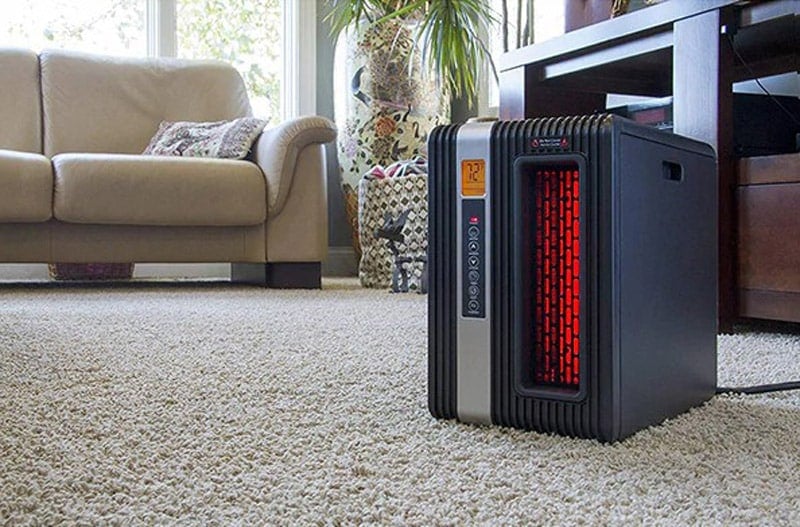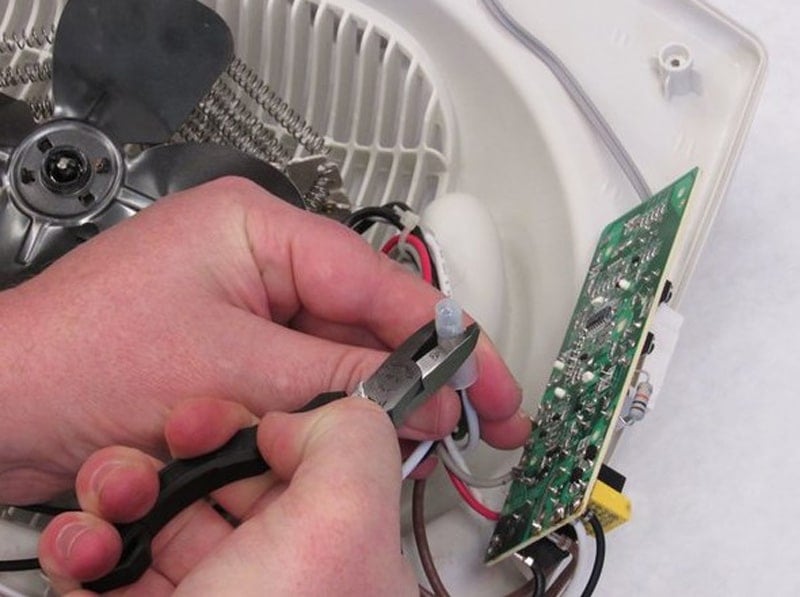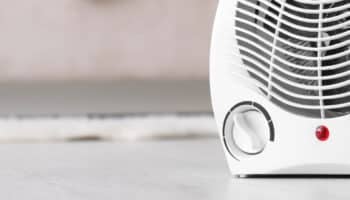Stuck trying to stop your space heater from shutting off?
Sadly, I’ve been there too. I know how annoying it can be to have this happen, especially when you just want to warm up the room to have a good night’s sleep.
A good space heater is a fantastic thing… until they start malfunctioning.
If your space heater keeps shutting off, chances are you have a damaged power cord or a dirty air filter. A faulty heating element or a fried circuit board could also explain the issue.
But, don’t worry. You’ve come to the right place to solve this problem.
Are you ready to stop your space heater from turning off? Let’s dive in!
Why Your Space Heater Keeps Shutting Off
#1 A Damaged Power Cord
Check your power cord often
Let’s start off this list by looking at one of the links in your power supply chain. The cord.
While this cable looks thick and sturdy on the outside, you must remember that, inside its rubber housing, there are several smaller cables that make it up and transport electricity.
They’re not easily damaged but are certainly not indestructible. In fact, apparently unimportant bad habits, such as storing your cable away improperly, keeping it tangled, or pressing against a wall at a sharp angle, are more than enough to do it in.
Depending on how badly it’s broken, it might not supply any electricity to your space heater, or it might be doing so intermittently. The latter condition is much more concerning than the former, as electricity bursts are known for causing short-circuiting.
This could explain why your electric heater keeps cutting off.
It is crucial that, as soon as you suspect this to be the source of the problem, you stop using it until you replace the suspicious cable.
Solution: Provided that you have a spare cord for testing, go ahead and use it. This will save you both time and money, as well as provide you with an immediate answer.
Just make sure it meets the same amperage and voltage requirements as the broken one.
If you don’t have a spare, that’s perfectly fine too. You can do a quick Google search on your space heater’s make and model to find the right replacement at any online marketplace.
#2 A Dirty Air Filter
Clean your filters regularly
You might be wondering why a heating appliance needs air filters, and the answer is simple.
To protect its internal components from airborne pollutants.
You see, while your space heater won’t pull in the air like a dehumidifier or air conditioner would, it’s constantly in contact with potentially harmful particles. Your air filter works as a shield between the outside world and your unit’s guts.
When it’s clean, it allows for the free flow of air and even the distribution of heat. However, as time passes, debris can collect in it and start making it hard for your appliance to dispose of heat as it should.
This might not sound like a big deal, but if left unattended for a long time, a dirty air filter could cause serious overheating.
If your electric heater turns off after a few minutes, there is a very good chance that your air filter requires a long overdue cleaning session.
Solution: In most cases, removing your air filter for cleaning should not be too difficult. Usually, there’s a dedicated compartment for this component, which requires no tools to be opened.
Make sure to unplug your space heater, and let it cool down for a couple of minutes before trying to do this, and then wash the filter under running water with a little dish soap.
After it has dried completely, vacuum off any remaining debris, and put it back into your unit.

#3 A Faulty Heating Element
A bad heating element could cause your appliance to overheat
Without its heating element, your space heater would be nothing but an expensive doorstop.
If you’re unfamiliar with what this component does, let me briefly explain. Your heating element is what allows your appliance to transform the electricity drawn from your wall outlet, into heat.
To do this, it uses a series of coils that can reach very high temperatures.
A bad heating element would not produce any heat. But, in some cases, things can go the other way. Sometimes, this part could get excessively hot, and cause the unit to overheat. This could explain why your space heater won’t stay on.
As you can imagine, it’s much better to have a component that does not heat, than to have one that could compete with the Sun.
Operating your space heater with an overheating heating element can have dire consequences, and permanently damage your machine. Please stop using it as soon as you suspect this to be your case.
Solution: Follow these steps to access your heating element:
- Carefully unplug the space heater, and let it cool down completely.
- Turn it around, and undo the screws at the back to remove the back panel.
- Expose your appliance’s guts.
- Locate the heating element (it should look like a big metal coil).
- Remove it carefully, and test it for continuity.
- Replace if necessary.
A heating element that produces no heat will likely show null readings on your meter. However, an overheating one might still show continuity, but that does not mean it’s not faulty.
Observe its behavior carefully.
If you’re a visual person like me and love detailed walkthroughs that you can follow along step by step, there are tons of online videos you can check out.
#4 A Fried Circuit Board
Your circuit board might have sustained permanent damage.
Last, but definitely not least, let’s consider the possibility of a fried circuit board.
This component is your space heater’s heart and soul. It allows all other internal components to communicate and process your inputs.
Normally, when boards fry, it’s either due to a large power surge caused by a blackout, or extreme overheating.
And while there are several countermeasures built into your appliance to prevent this from happening, it will sadly always be an unwanted possibility.
Just as it happens with your power cord. If the damage is total, your unit won’t even turn on. But if it’s only partial, it would explain why your space heater keeps shutting off after some time.
Solution: This one’s a bit tricky.
You’ll have to check your unit’s documents to determine what the best solution is. More often than not, when your circuit board is fried, your options are greatly reduced, but let’s not lose hope yet.
Please read on.

When Should You Call a Pro?
The answer to this question will depend greatly on the status of your warranty and whether the solutions above worked for you.
If you’re still under coverage and don’t mind waiting a couple of days or weeks for your manufacturer to send a technician to your home, by all means, go ahead and give them a call.
Unless specified otherwise in your documentation, they should take care of the repairs for free.
Provided that your warranty has expired, you’ll have to weigh the cost of repairs vs the cost of buying a new unit. Just as I was saying in the previous point, sometimes, the only option is getting a new part.
And while replacements, such as a new circuit board are not awfully expensive, the cost of labor to have them installed and configured, can be. As a general rule, paying for repairs that equal 50% or more of the price of a new model with similar features, is a bad investment.
Conclusion
To have your space heater keep shutting off can be… frustrating, to say the least, as it is vital to have a steady heat source during cold nights and humid seasons.
Luckily, as I hope you’ve learned in this piece, addressing most of the causes behind this situation is fairly simple, and not very time-consuming. In most cases, double-checking your power sources, and keeping your filter clean, should do the trick.
Thank you so much for sticking with me all the way to the end. If you found this article helpful, why not become an expert in the subject through our other incredible resources below?
I wish you all the best!







